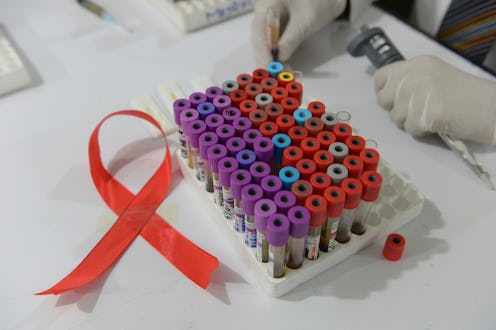News
Texas Wants Sex Ed Money Used For Abstinence Ed
After a heated debate between GOP and Democratic legislators, the Texas House of Representatives voted Tuesday to strip $3 million from Texas' HIV and STD prevention programs and put the money towards beefing up the state’s abstinence education. Introduced by GOP state Rep. Stuart Spitzer, the budget amendment sparked contentious and oddly personal arguments over the best way to tackle the state’s soaring teen pregnancy and HIV infection rates. While Texas currently allows school districts to decide themselves how best to teach (or not teach) sexual education to students, abstinence must be stressed at least as much as other materials on how to protect one’s sexual health.
If passed with the final budget, this initiative would use public dollars to indicate state lawmakers’ policy preferences when it comes to regulating their young constituents’ sexual activities.
Tuesday’s debate on the Texas House floor demonstrated that safe sex is no sideline issue, from the standpoint of either religious proscription or public health. Democrats charged that public health programs that focused on teaching safe sexual practices and testing for STDs were more attuned to people's actual sexual choices. Led by Spitzer, GOP legislators in turn advocated for relying on abstinence methods to prevent teenage pregnancies and protect the population’s sexual health. After all, as Spitzer reasoned, it worked for him:
What's good for me is good for a lot of people.
Spitzer's example provoked state Rep. Harold Dutton, Jr., a Democrat from Houston, to question his colleague further on why his personal lifestyle choices should serve as a model for all Texas schoolchildren:
Were you taught abstinence education? Did it work?
Spitzer responded that he had been a virgin until his marriage at age 29. He had only had sex with one woman his entire life, he told his colleagues. His wife. Then things turned acrimonious. “And since you brought it up, is that the first woman you asked?” Dutton rejoined.
Calls for decorum rang out from the floor.
"They wanted to catch me off guard, paint me into a corner and catch me being a hypocrite," Spitzer told The Texas Tribune afterwards. "But if people ask questions, I answer questions."
Spitzer later acknowledged that the state’s abstinence education programs weren’t working currently.
The numbers seem to indicate that the current arrangements aren’t doing so hot. Texas ranks fifth for the most teen pregnancies and first for the highest degree of repeat teen mothers; according to the Centers for Disease Control, the Lone Star State also suffers from the third highest rate of HIV infections nationwide. The Texas Department of State Health Services notes that since 2009, there has been a 20 percent increase in the number of people statewide known to carry HIV. The department estimates that a whopping 13,000 Texans who are HIV positive live undiagnosed and unaware.
But Spitzer added that refraining from sex is effectively HIV prevention.
Dutton responded that clearly enforcing sex-free habits on all Texas citizens before marriage was unrealistic.
"When people sing from the hymn book of abstinence, they want people to do what he did," Dutton said. "It might not be realistic, and we can't put our heads in the sand and believe that."
The measure still has a ways to go before it becomes law and drains funds from key sexual health programs in Texas. The $210 billion, two-year budget next heads to the Texas Senate, which is also largely dominated by conservatives.
Images: Getty Images (3)
